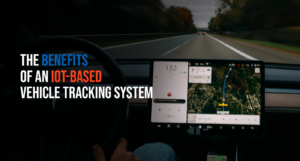In the fast-paced world of modern transportation, staying ahead of the curve is essential for businesses and individuals alike. The advent of the Internet of Things (IoT) has brought about a paradigm shift in the way we perceive and manage vehicles. One of the groundbreaking applications of IoT in transportation is the Vehicle Tracking System (VTS), which has evolved into a powerful tool with a myriad of benefits. In this blog post, we will explore the latest advantages offered by an IoT-based Vehicle Tracking System, demonstrating how it has become a game-changer in optimizing efficiency, safety, and overall operational excellence.

- Real-time Visibility
One of the primary advantages of an IoT-based vehicle tracking system is the provision of real-time visibility into the entire fleet. Fleet managers can monitor vehicle locations, routes, and statuses in real-time. This not only enhances operational efficiency by optimizing routes but also aids in quick decision-making and response to unforeseen circumstances such as traffic congestion or road closures.
- Improved Asset Utilization
IoT-based tracking enables businesses to make the most of their assets. By analyzing data on vehicle usage, idle time, and mileage, fleet managers can identify underutilized assets and optimize their allocation. This not only maximizes the efficiency of each vehicle but can also lead to cost savings through reduced fuel consumption and maintenance expenses.
- Enhanced Route Optimization
The system’s ability to collect and analyze data allows for intelligent route planning. By considering factors such as traffic conditions, weather, and road closures, fleet managers can optimize routes to minimize travel time and fuel consumption. This not only reduces operational costs but also contributes to a more environmentally sustainable operation.
- Predictive Maintenance
An IoT-based vehicle tracking system goes beyond simple location tracking; it also monitors the health of the vehicles. By collecting data on engine performance, mileage, and other relevant parameters, the system can predict potential maintenance issues before they become critical. This proactive approach to maintenance not only reduces downtime but also extends the lifespan of the vehicles, leading to significant cost savings.
- Comprehensive Security
Safety is a paramount concern in the transportation industry. IoT-based vehicle tracking systems enhance security through features like geofencing and real-time alerts. Geofencing allows fleet managers to define virtual boundaries, and if a vehicle deviates from the set route, an alert is triggered. This not only helps prevent theft but also ensures that drivers adhere to assigned routes, contributing to overall road safety.
- Driver Behavior Monitoring
Understanding and improving driver behavior is crucial for both safety and efficiency. IoT-based tracking systems can monitor various aspects of driver behavior, such as speed, harsh acceleration, and braking. By providing feedback to drivers and implementing incentive programs based on safe driving practices, fleet managers can promote a culture of safety, reducing the risk of accidents and associated costs.
- Regulatory Compliance
In an industry subject to numerous regulations, ensuring compliance is a constant challenge. IoT-based tracking systems simplify compliance management by automatically recording and reporting data relevant to regulations, such as hours of service. This not only saves time but also helps avoid penalties associated with non-compliance.
- Fuel Efficiency and Cost Savings:
Fuel consumption is a significant expense for any fleet-based business. An IoT-based Vehicle Tracking System helps optimize fuel efficiency by providing insights into driving behavior, idle times, and fuel consumption patterns. Businesses can implement strategies to reduce fuel wastage, such as optimizing routes, monitoring engine performance, and promoting eco-friendly driving habits. The result is not only a greener fleet but also substantial cost savings.
- Enhanced Fleet Management
Fleet managers can leverage IoT-based tracking systems to gain comprehensive insights into their vehicle fleets. This includes monitoring vehicle health, scheduling maintenance based on actual usage rather than fixed intervals, and ensuring compliance with regulations. By proactively managing maintenance and addressing issues promptly, companies can extend the lifespan of their vehicles and minimize unexpected breakdowns.
- Data-Driven Decision-Making
The wealth of data generated by IoT-based vehicle tracking systems provides valuable insights that can drive informed decision-making. By analyzing historical and real-time data, businesses can identify trends, optimize routes, and make strategic decisions to enhance overall performance. This data-driven approach enables companies to stay competitive in a rapidly evolving industry.
In conclusion, the adoption of an IoT-based vehicle tracking system offers a multitude of benefits for businesses operating in the transportation and logistics sector. From real-time tracking and enhanced operational efficiency to increased security and driver safety, the advantages are diverse and impactful. As technology continues to advance, embracing IoT solutions becomes not only a competitive advantage but a necessity for those looking to thrive in the dynamic landscape of modern fleet management. The future of transportation is connected, efficient, and secure, and IoT-based vehicle tracking systems are at the forefront of this transformative journey.
- Comprehensive Security

